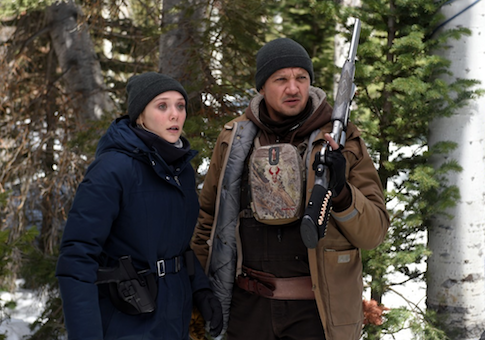There's something to be said for Wind River's admirable efficiency: Simple yet never simplistic, it's a self-contained procedural clocking in at under two hours filled with impressive performances and genuine pathos that gives viewers a peek at a world they would otherwise never consider. In a summer filled with blockbusters, bloat, and bad box office receipts, Wind River is a refreshingly understated drama for the underserved adult filmgoer.
Writer/director Taylor Sheridan's film is sure-handed and starkly shot; in the opening moments, we see an underdressed woman fleeing through darkness and snow before collapsing, coughing up blood. It's a creepy, striking image, like something out of a horror film, and it serves as a stark warning before the action begins that we are entering a pitiless, inhospitable land. As Cory Lambert (Jeremy Renner) explains to FBI agent Jane Banner (Elizabeth Olsen) after finding the body, even the air can kill you—deep breaths of it freeze the lungs, causing the alveoli to burst.
The girl drowned on dry land, choking on her blood. But not before she was raped.
Unraveling the mystery of her death is the nominal point of the film, but Sheridan seems as interested in introducing us to the forgotten world in which this crime has taken place as anything else. Cory's existence seems to straddle the Wind River Indian Reservation: He is white and employed by the feds so he'll always be an outsider; he nevertheless has deep ties to the reservation, his ex-wife and son a member of the Arapaho tribe that lives there.
Sheridan, who wrote Sicario and earned an Oscar nomination for Hell or High Water last year, expertly leaves bits and pieces of information for us to find, insinuating the viewer into the world without simply explaining who we are watching or what they are doing with gobs of exposition. One small example: We see Cory hunting wolves before heading off on a journey to catch a mountain lion, but it isn't until he closes the door of a truck with "U.S. Fish and Wildlife Service" on the side that we know who he does it for, why he's given free run on the reservation where most of the action takes place. Rather than simply having Cory spit out his job title, we see him at work—moving cautiously through the snow; taking down packs of predators from a hidden vantage—and, in doing so, we learn how he operates.
Renner is perfect as Cory, exuding a sort of quiet mournfulness throughout that tells us more about the tracker's suffering than any lines of dialogue could. When we finally are told about his family's tragedy, we've practically filled the story out in our head on our own. Olsen, playing a rookie FBI agent out of her element but not out of her depth, provides the perfect audience surrogate, serving as our eyes and ears in this foreign landscape. Jon Bernthal has a small but important role in a critical scene, proving yet again that he makes every movie he's in about 20 percent better.
And Sheridan has put together a top-notch cast of Native American supporting actors. Gil Birmingham, with whom Sheridan worked on Hell or High Water, nails his part as a stoic, grieving father; we hear, but do not see, his sobs after Cory arrives to discuss the bad news, driving home both the cultural need to maintain a face of stone and the paternal need to air his grief only with those who understand his suffering. Julia Jones, meanwhile, only has a few scenes as Cory's ex-wife, but her brusque manner and clipped speech tell us everything we need to know about the pair's relationship.
Sheridan makes a narrative choice near the end of the film that caused some consternation among the critics with whom I saw the film; without spoiling it, all I can say is that it's a daring structural idea, one that disorients audiences for the purpose of driving home the pain and horror of the crime Cory and Jane are investigating.
Wind River isn't as epic in scope as Sicario, nor does it feel quite as timely as Hell or High Water, a movie very much about life in the American moment leading up to Donald Trump's electoral victory. But it's a very solid piece of filmmaking, one that doesn't waste a shot in telling its admirably limited story. The multiplex would be a more hospitable place were it filled with a greater quantity of movies like this one.
